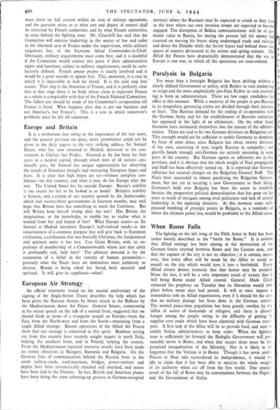European Air Strategy
An official statement issued on the second anniversary of the signing of the Anglo-Soviet Treaty describes the help which has been given the Russian Armies by blows struck in the Balkans by the Mediterranean Army Air Force. General Smuts, commenting in his recent speech on the talk of a second front, suggested that we should think in terms of a triangular assault on Europe—from the East, from the North-west and from the South—emanating from a single Allied strategy. Recent operations Of the Allied Air Forces show that our strategy is conceived in this spirit. Bombers setting out from this country have recently sought targets in north Italy, helping the southern front, and in Poland, helping the eastern. From the Mediterranean repeated intensive attacks have been made on enemy objectives in Hungary, Rumania and Bulgaria. On the German lines of communication behind the Russian front in the south railway-yards, road-junctions, bridges, power-stations and depots have been systematically attacked and smashed, and mines have been laid in the Danube.. In fact, British and American planes have been doing the same softening-up process in German-occupied territory where the Russians may be expected to attack as they have in the west where our own invasion troops are expected to become engaged. The disruption of Balkan communications will be of par- ticular value to Russia, for during the present lull the enemy had counted on moving his forces along undamaged roads and railways and down the Danube while the Soviet forces had behind them vast spaces of country devastated in the winter and spring retreats. The Allied Air Forces have dramatically demonstrated that the war in Europe is one war, in which all the operations are inter-related.


























 Previous page
Previous page